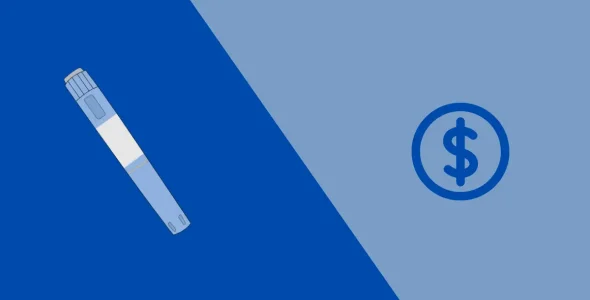How long do you stay on semaglutide for weight loss? Beyond the quick fix
You've started your semaglutide journey and are seeing incredible results. But a question begins to form in the back of your mind: 'Is this forever? The answer isn't a simple number, it's a strategy for long-term health.
Key highlights
- You can use semaglutide for as long as needed to manage your weight. You can continue taking it as long as you and your doctor agree it’s safe for you and the side effects are manageable.
- The strongest and longest-lasting benefits come with consistent, long-term use, showing that semaglutide is meant for ongoing treatment rather than a short-term fix.
- Many people regain weight after stopping, which is why ongoing treatment is often recommended.
- Semaglutide can also improve blood sugar, blood pressure, heart health, and quality of life.
Obesity, like high blood pressure or diabetes, is a chronic condition that often requires long-term management rather than a short-term fix. Just as people take medication and make lifestyle changes to control blood pressure or blood sugar, ongoing treatment and healthy habits are key for managing obesity.
If you’re taking Ozempic or Wegovy (both contain the active ingredient semaglutide), you might wonder how long you can stay on them for weight loss. The answer is that semaglutide is designed for long-term, even indefinite use for chronic weight management. There’s no set time limit, and many people stay on it to maintain their results. It was originally developed for diabetes and meant for ongoing treatment.
If you’re doing well on semaglutide, you can keep taking it after reaching your goal weight to maintain your results. For some people, this may mean staying on it for life.
Is semaglutide for weight loss a short-term fix or a long-term solution? We break down the treatment timeline, the reality of weight regain, and how to build a sustainable plan for keeping the weight off.
What is semaglutide, and how does it work for weight loss?
Semaglutide is a glucagon-like peptide-1 (GLP-1) receptor agonist used to treat type 2 diabetes and help with weight loss. It’s available under the brand names Wegovy, Ozempic, and Rybelsus. Wegovy is FDA-approved for chronic weight management in obese and overweight patients. Ozempic and Rybelsus are prescription drugs approved for adults with type 2 diabetes.
Semaglutide belongs to a class of drugs called glucagon-like peptide-1 (GLP-1) receptor agonists. It mimics a natural hormone called GLP-1, which helps control blood glucose by releasing insulin when you eat, lowering blood sugar. GLP-1 also slows down how fast food moves through your stomach (gastric emptying), making you feel full longer, and helps control appetite by lowering blood sugar levels and promoting weight loss.
The short answer: It’s a marathon, not a sprint
Clinical trials and real-world evidence treat obesity as a chronic condition, much like high blood pressure or diabetes, which means it usually requires ongoing treatment rather than a short-term fix.
There’s no set time when you have to stop taking semaglutide. It can be used long-term. This applies whether you’re on Ozempic, Wegovy, or compounded semaglutide.
Since it was first made to help people with type 2 diabetes control their blood sugar, it was indicated for long-term (sometimes lifelong) use. If you’re tolerating it well and it’s working for you, you can stay on it indefinitely. Usually, you’ll start with a low dose, slowly increase, and then continue on a maintenance dose to manage your weight.
Clinical trials and real-world experience show that semaglutide is both safe and effective when used long term, and stopping often leads to weight regain. That’s why, for most people, staying on a maintenance dose indefinitely is the most reliable way to keep the weight off and protect long-term health.
Effectiveness for weight loss
Semaglutide has shown great potential for weight loss. Studies have shown an average weight loss of 15% of body weight over 26-30 weeks, especially for people with a body mass index (BMI) of 30 or higher, or those with a BMI of 27 or higher and obesity-related health issues like type 2 diabetes.
Studies show that semaglutide (Wegovy and Ozempic) reduces the risk of cardiovascular events like stroke and heart attack. It also improves the body’s ability to handle fat, resulting in better cholesterol and triglyceride levels.
Semaglutide mimics a hormone called GLP-1, which is produced in the gut after eating. It lowers blood sugar by stimulating insulin production in the pancreas, reducing sugar production in the liver. This helps keep blood sugar levels more stable between meals.
Understanding the timeline: What clinical trials say
The STEP 1 trial
This landmark study demonstrated that participants taking semaglutide lost up to 15% of their body weight over 68 weeks. However, those who stopped the weight loss medication regained about two-thirds of the weight they had lost within one year, highlighting the importance of continued treatment for lasting results.
Beyond two years
A large study published in 2024 followed 17,604 adults and found that people taking semaglutide kept losing weight for about 65 weeks and were able to maintain their weight loss for up to 4 years.
After 2 years (104 weeks), 67.8% of people on semaglutide had lost at least 5% of their body weight, and 44.2% had lost at least 10%. In comparison, only 21.3% and 6.9% of people taking a placebo reached those goals. A smaller group of people on semaglutide lost 15–25% or more of their weight.
The study also showed that semaglutide lowered the risk of major heart problems, like heart attack or worsening heart failure, by 20% in people without diabetes who had cardiovascular disease, overweight, or obesity.
The three phases of semaglutide treatment
Here’s a simple version of the three phases of semaglutide treatment:
Phase 1: Dose escalation (weeks 1-16)
This phase helps your body adjust to the medication and lowers the risk of stomach-related side effects of semaglutide.
The standard Wegovy schedule starts at 0.25 mg and slowly increases through 0.5 mg, 1.0 mg, 1.7 mg, and finally to higher doses of 2.4 mg. During this time, weight loss is usually gradual as your body adapts.
Phase 2: Active weight loss (months 4-12+)
Once you reach the maintenance dose (2.4 mg for most people on Wegovy), the medication works at its full effect. This is when weight loss tends to be the fastest and most noticeable, though it may slow down and plateau over time. It’s also the most important stage to build lasting lifestyle habits like healthy eating and regular activity.
Phase 3: Maintenance (lifelong)
The long-term goal is to maintain your significant weight loss using the optimal dose that works well for you. Some people need the full 2.4 mg, while others may do fine on 1.0 mg or 1.7 mg. Finding the right balance requires ongoing check-ins with your doctor to manage side effects, costs, and your long-term results.
Typical clinical approaches: Short course vs. long-term maintenance
For people using semaglutide to lose weight, how long the treatment lasts can differ based on their health, weight-loss goals, and how well the medicine is working for them.
Short course (6 to 12 months)
This option may work best for people with smaller weight-loss goals, those who can’t tolerate side effects, or those limited by cost or access. Many clinics have seen meaningful results within this 6–12 month period.
The STEP 1 trial gives clear data on how much weight people lost over time with semaglutide 2.4 mg compared to a placebo. Here’s what the results showed:
Timeline of expected weight loss:
- After 4 weeks: Some weight loss is usually seen in the first month, though it varies by person. On average, participants lost about 3.8% of their starting weight with semaglutide.
- After 12 weeks (3 months): People on semaglutide lost about 9.6% of their body weight, compared to 2.8% with placebo.
- After 6 months: The average weight loss was 13.8% with semaglutide versus 3.7% with placebo.
- After 12 months: Most people lost around 15–17% of their starting weight with semaglutide plus healthy lifestyle changes. Some lost more than 20%, while others had a smaller loss of about 5–10%.
- When weight loss may plateau: For many people, weight loss levels off at around 9–12 months. Over 1–2 years, most people maintain a loss of about 10–15% of their starting weight if they keep up with treatment and lifestyle changes.
Standard clinical recommendation (12 to 24 months)
The length of semaglutide treatment for weight loss can differ, but many doctors suggest staying on it for at least 12 to 24 months. This gives people time to reach their weight-loss goals and then move into a maintenance phase, where the dose may be adjusted to help keep the weight off.
The STEP 1 trial studied semaglutide 2.4 mg in 1,961 adults with overweight or obesity, including some who had bariatric surgery. It was a high-quality study that showed major benefits:
- Weight loss: People taking semaglutide lost an average of 14.9% of their body weight after 68 weeks, compared to just 2.4% with placebo.
- High success rate: 86% of participants lost at least 5% of their weight, and 75% lost at least 10%, compared to only 32% and 15% in the placebo group.
- Better health and wellness markers: Semaglutide reduced waist size, blood pressure, and triglycerides, and improved blood sugar and quality of life.
- Safety: The most common side effects were stomach-related, like nausea and diarrhea. These were usually mild to moderate and improved over time.
The level of weight loss seen with semaglutide was greater than with any other weight-loss treatment before, making it a breakthrough in obesity management. These results led to FDA approval of semaglutide 2.4 mg (Wegovy) for long-term weight management in adults with overweight or obesity.
Long-term or indefinite use
In clinical trials, people usually took semaglutide for about 68 weeks or an extended period. During this time, participants lost weight significantly, often more than 10–15% of their starting weight. Semaglutide also improved blood sugar, blood pressure, and other health risks, making it especially helpful for people with type 2 diabetes or health problems linked to extra weight.
A 2021 study included nearly 2,000 adults who were overweight or had obesity but did not have diabetes. Participants received once-weekly Wegovy injections or a placebo for 68 weeks and followed healthy habits like eating a healthy diet and being more active.
When to stop semaglutide treatment
There’s no set time to stop taking semaglutide, but certain factors might make it necessary to stop weekly semaglutide injections. These include:
- Reaching your goals: Some people may choose to stop semaglutide once they’ve reached their target weight or achieved a specific health goal. Your healthcare professional can help decide if it’s the right time to stop and guide you on the best way to do it safely.
- Side effects and tolerance issues: Unmanageable side effects or tolerance issues are another common reason people stop semaglutide. If side effects don’t improve with time or dietary changes, your doctor may suggest lowering your dose or trying an alternative weight loss drug to make it easier to tolerate.
- Cost and insurance coverage: Cost and insurance coverage are important factors in deciding whether to continue semaglutide. For some people, the out-of-pocket expense can become too high to manage long-term. Changes in insurance coverage, such as reduced benefits or loss of coverage for the medication, may also make it necessary to stop. In these cases, discussing options with your doctor or insurance provider can help find a solution.
- Life changes: Life changes can impact whether it’s safe or appropriate to continue semaglutide. For example, pregnancy or planning to become pregnant often requires stopping the medication, and certain surgeries may mean pausing it temporarily. Changes in overall health, like new medical conditions or reactions to the drug, can also make it necessary to adjust or stop treatment. Your doctor can help determine the safest plan based on your situation.
What happens when you stop semaglutide?
Semaglutide reduces hunger and helps you feel full. When you stop the medication, those effects wear off, and hunger, cravings, and “food noise” often come back. This is a biological change, not a failure of willpower.
In the STEP-1 follow-up trial, people who stopped semaglutide regained about two-thirds of their weight loss within one year. That finding has been reproduced in extensions and reviews of GLP-1 trials.
Typical timeline after stopping
Weight regain often begins within months and can continue through the first year. How fast and how much varies by person and their lifestyle changes while on treatment. Reviews and guidance note that early rebound is common, but stronger habits (healthy diet and increased physical activity) can reduce how much weight returns.
Semaglutide manages the body’s weight-control systems. When you stop it, those biological forces (less fullness, more hunger) shift back. It’s biology, not weakness.
Although weight regain is common, it is not inevitable. With a plan that includes strong lifestyle habits, activity, dietary changes, and medical follow-up, many people retain part of their weight loss or limit the rebound.
You can stop suddenly with no proven medical catastrophe, but clinicians often recommend a taper or transition plan to reduce rebound risk and give you time to strengthen non-drug strategies or other interventions. Talk with your doctor about a gradual plan, follow-up, or alternative medications if needed.
Creating a long-term sustainable plan
It’s important to understand that semaglutide is not a quick fix for sustainable weight loss. Semaglutide works best when combined with healthy habits like eating a balanced diet and increased physical activity as part of an overall weight management plan.
Lifestyle changes
Here’s a list of actionable steps for maintaining weight loss, even after stopping the medication:
- Decrease your calorie intake: Cutting about 500 calories from your daily intake can help support weight loss.
- Eat nutrient-rich foods: These foods give your body important vitamins and minerals while being lower in added sugar, unhealthy fats, and salt. They help you get the nutrients you need without adding too many extra calories.
- Mindful habits: Paying attention to what and how you eat can make a big difference. Mindful eating means slowing down, enjoying your food, and noticing when you feel full. Practicing portion control helps you eat the right amount without overeating, which supports steady weight loss and long-term healthy habits.
- Be more active: Try to get at least 150 minutes of moderate exercise each week to help with weight loss.
- Manage stress: Stress can affect how much you eat and how your body stores fat, which may lead to weight gain. Finding healthy ways to cope with stress can support weight loss.
- Get good sleep: Not getting enough sleep can raise the risk of weight gain and make you eat more. Aiming for 7 to 9 hours of sleep each night may help with weight loss.
Partnering with your healthcare team
Deciding whether to keep taking or stop semaglutide is something you and your doctor should decide together. A dietitian, therapist, or other specialists can also support your weight loss journey by helping with food intake, stress, and behavior changes.
Regular check-ins with your healthcare provider, dietitian, or even a support group can make a big difference. They help you stay on track, adjust your plan when needed, and encourage you to keep going.
The maintenance dose strategy
After reaching your weight-loss goals, the focus often shifts from losing excess weight to keeping it off. This is where a maintenance dose comes in.
Your doctor may work with you to find the optimal dose of semaglutide that still helps control your appetite and prevent weight regain. For some people, this might be the full 2.4 mg dose. For others, a lower dose like 1.0 mg or 1.7 mg may be sufficient.
The goal is to balance effectiveness with fewer side effects and potentially lower costs for those without insurance coverage. This process requires regular follow-ups with your doctor to make adjustments as needed.
What if I regain weight?
It’s normal to regain some weight after treatment. This doesn’t mean you’ve failed or that your progress is lost. Weight management is a lifelong journey, and ups and downs are a normal part of it.
If you notice significant weight gain, talk to your doctor. With their guidance, you may be able to restart semaglutide or adjust your treatment plan to get back on track.
Safety considerations for long-term use
Semaglutide can stay in your body for about five to seven weeks. Its half-life is one week, which means it takes a week for the amount in your body to drop by half, then another week for it to drop by half again, and so on.
- Common side effects: The most frequent issues with long-term semaglutide use are digestive issues, such as nausea, constipation, or diarrhea. Some people may also experience gallbladder problems. Rare but serious risks like pancreatitis have been reported, so it’s important to know the warning signs and stay in touch with your doctor.
- Longer-term unknowns: Clinical trials lasting over 2 years show that semaglutide is generally safe and effective. But, like with any medication taken for years, there are still some unknowns. That’s why routine monitoring, such as lab tests, checking for gallbladder symptoms, and discussing mental health changes, is an important part of ongoing care.
- Balancing risks and rewards: For many people with obesity or metabolic conditions, the health benefits, like weight reduction, lower blood sugar levels, and improved heart health, can outweigh the risks. Still, this decision is highly personal and should be made with your healthcare team.
Semaglutide is generally safe, and for many people, the benefits are greater than the possible long-term risks. Your doctor can help determine if it’s safe for you to use.
Cost, access, and adherence: Practical limits on duration
Semaglutide is expensive, often costing more than $1,000 a month without insurance or discounts. For many people, this high price is the main reason they stop treatment earlier than planned.
Insurance coverage depends on your plan. Some insurers will cover semaglutide if obesity is diagnosed or if related health conditions (like diabetes or heart disease) are present. However, prior authorizations and approvals can make ongoing access difficult. Novo Nordisk, the maker of brand names Wegovy and Ozempic, offers savings cards and patient assistance programs that may help lower costs for eligible patients.
Even with coverage, side effects, cost pressures, and life changes can make it hard to stay on treatment long term. Research shows many people stop the treatment earlier than recommended.
FAQ’s
Can I just take semaglutide until I hit my goal weight?
Yes, many people take semaglutide until they reach their goal weight, but studies show that stopping it often leads to weight regain. The best approach is to use it not just to hit your goal weight, but also to help maintain your results along with healthy habits.
Are there risks to being on semaglutide for years?
Research on taking semaglutide for many years is still limited, but studies so far suggest it is generally safe for long-term use. Most side effects are stomach-related, and serious risks are rare compared to the health dangers of obesity. Regular monitoring with your doctor is recommended if you stay on it long term.
What’s the longest someone can be on it?
Clinical trials on semaglutide have studied participants for more than two years, and similar medicines have been used safely for up to a decade. Doctors often consider semaglutide as a long-term treatment, much like medicines for other chronic health conditions like blood pressure or diabetes.
Does my body become dependent on it?
Semaglutide is not addictive, so your body doesn’t become dependent on it in that way. But if you stop taking it, your body usually goes back to its old patterns, which can lead to weight regain. This is a natural biological response, not a sign of drug dependence.
Do I have to take Wegovy for the rest of my life?
You may not need to take Wegovy for life, but many people continue using it to maintain their results. Stopping treatment often leads to weight regain, so the decision depends on your goals and health plan with your doctor.
How long before I see results?
Many people see weight loss within the first 2–4 months, and studies show the most significant results are realized over 6–12 months. Your exact results may vary based on your body and lifestyle.
How do I talk to my doctor about stopping?
You can ask your doctor how to safely stop, whether slowly tapering the dose is recommended, and what alternatives might help you maintain results. It’s also a good idea to schedule follow up visits with your provider to monitor for any early weight regain.
Conclusion
Semaglutide is a long-term tool for managing a chronic condition like obesity. Stopping the medication can often lead to weight regain, but working closely with a healthcare provider can help create a plan that supports lasting results.
Taking control of your health is empowering. Whether you continue long-term medication or transition to lifestyle-only management, the goal is to find a plan that works best for you.
The duration of your treatment is not a sign of weakness. It’s a commitment to maintaining your health gains. This is a journey you don’t have to navigate alone. Talk openly with your healthcare provider about your goals, concerns, and options to create a plan that works for you for the long term.






